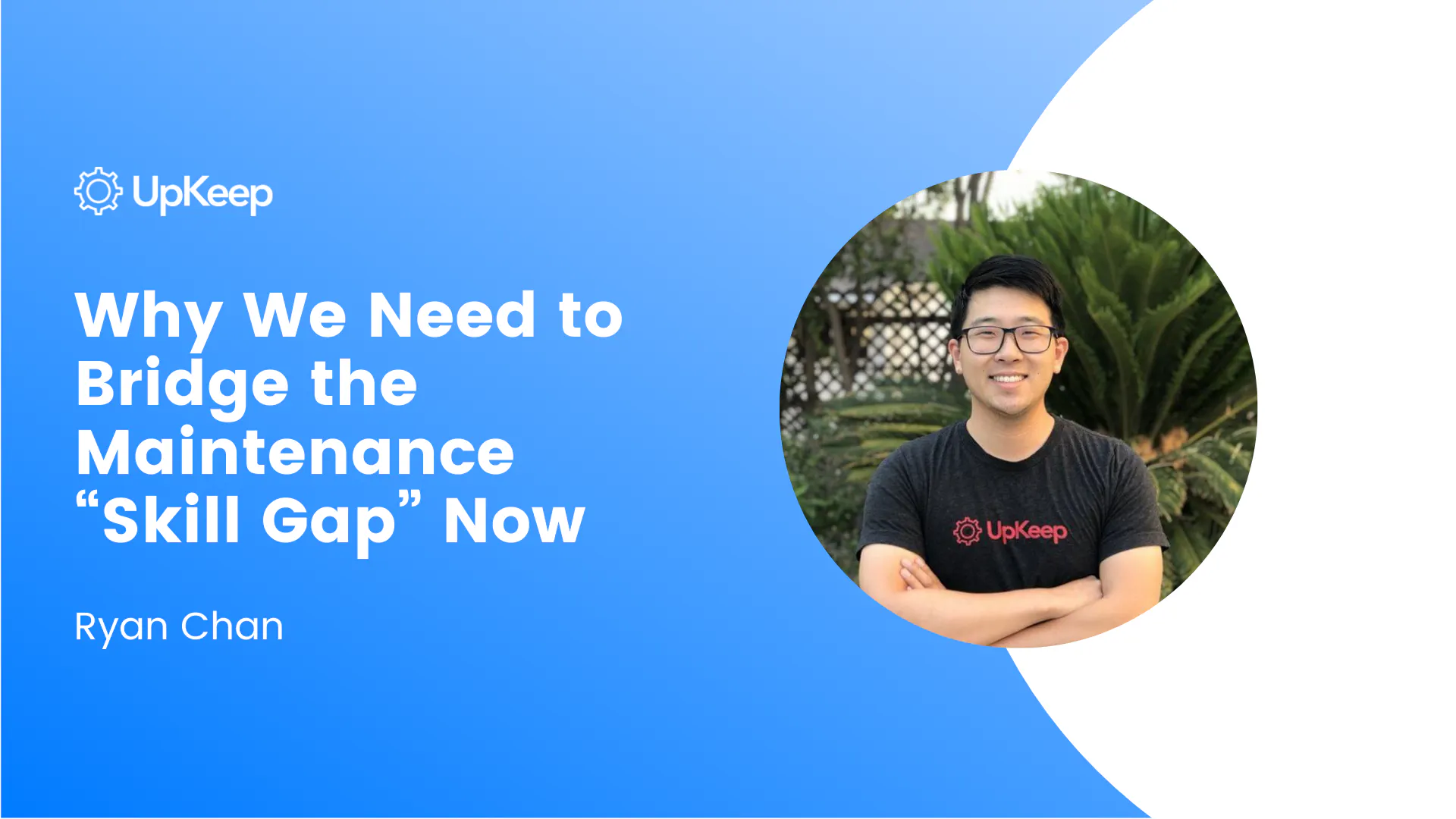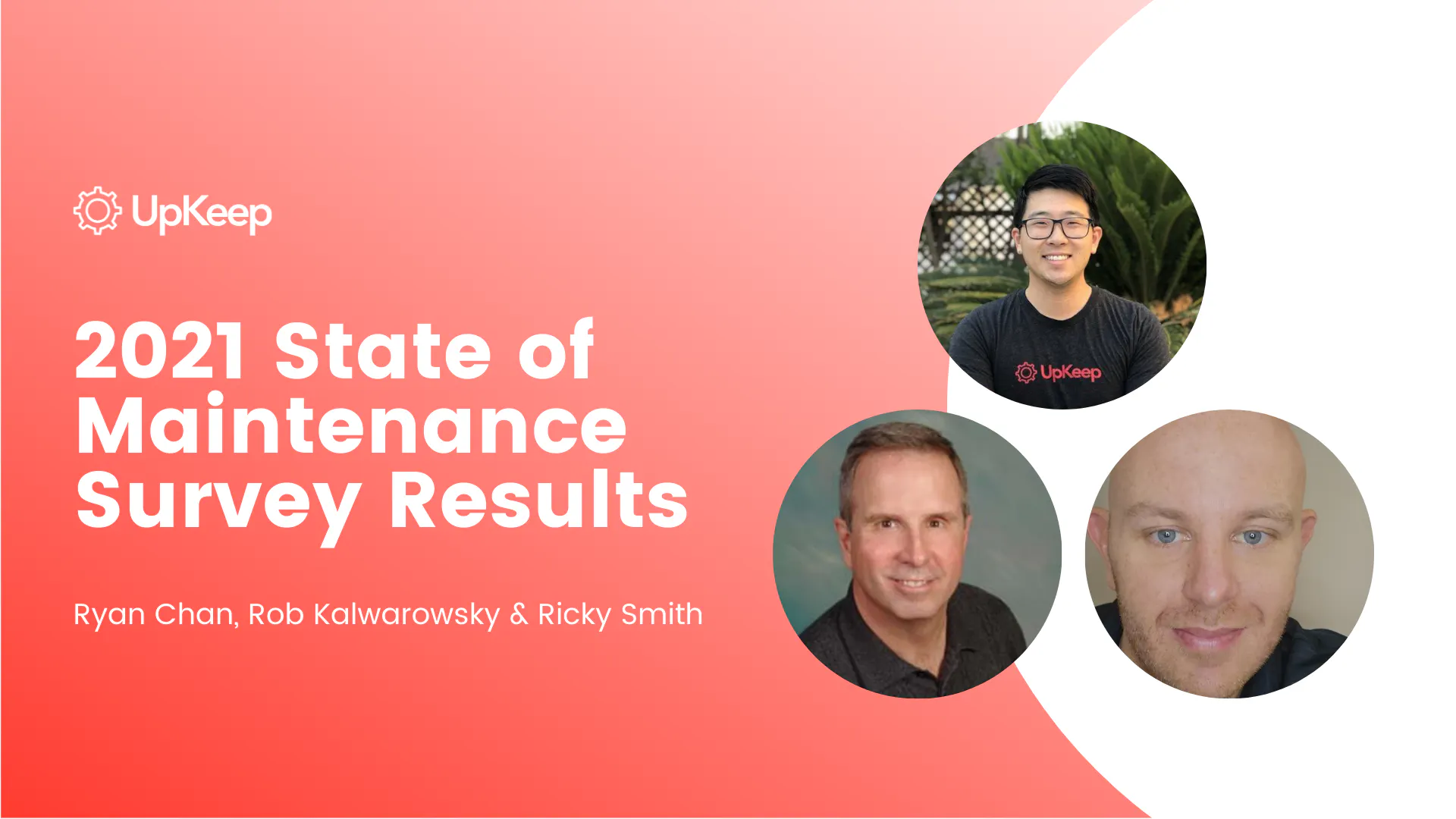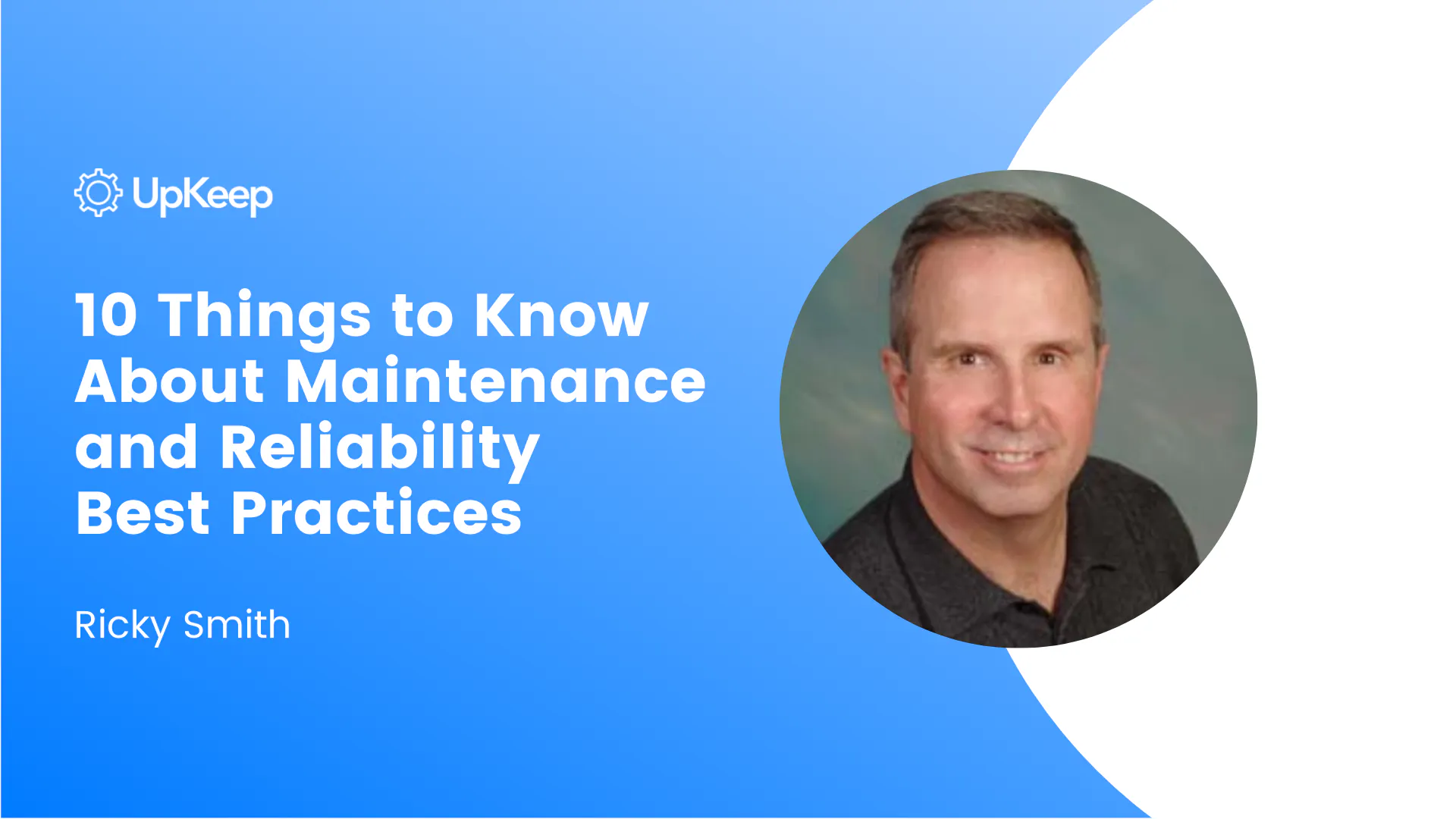Webinar
The Future of Maintenance: Asset Operations Management
Duration: 30 minutes
Published on: June 04, 2024
Watch UpKeep CEO and Founder, Ryan Chan and Henry Pray, Director of Product Management, for “The Future of Maintenance: Asset Operations Management''
Uniquely positioned to tackle industry challenges, UpKeep brings maintenance, reliability and operations teams together in a new approach called Asset Operations Management.
You'll learn:
- Why UpKeep was recently recognized as a Leader in IDC’s 2021 Marketscape
- How UpKeep is delivering the future today with a continuing commitment to technician experience and adoption
- What you need to do to ensure you’re future focused and not left behind
Brought to you by The Maintenance Community. Join here for more exclusive events.
Webinar Transcript
Ryan Chan:
Thank you everyone for joining us today where I'm gonna be talking a little bit about the future of maintenance here at UpKeep, and more specifically, we're gonna be talking about asset operations management. A little bit about myself, my name is Ryan, I'm the CEO and founder of UpKeep. I'm also joined here today with our Director of Product Management, Henry Pray, who's also gonna be talking a little bit more about our product and the future of it. So again, thank you everyone for helping make today a big success.
What I also wanted thank everyone for doing is helping UpKeep the named a leader within the CMMS and MarketScape. More recently, IDC named UpKeep as a leader within the entire category, and that's all thanks to everyone here today, all of our customers, industry thought leaders and people that have supported us over the last five years, I feel incredibly privileged to be named a leader in the space, and we would not be here without you.
Just a reminder of who we are and what UpKeep is. UpKeep was founded in 2016, and over the past five years, we've grown a ton, we have over 3000 customers all around the world. We've raised $50 million in venture capital, and we have over 6000 community members that have supported UpKeep and supported our entire community towards basically changing and innovating on this entire industry, so very, very grateful for all of the amazing progress that we've made as a company, and it's all thanks to again, everyone here that's joined in our webinar and that have supported us along our path over the last five years to really transform this entire industry.
But enough about us, enough about UpKeep. What I'm here to talk about today is really the future of maintenance where it's headed, and our belief around the future of our entire industry. And my goal today is to inspire all of us here within this webinar that's listening to us live, joining us from all around the world or maybe watching a recording of this, a couple of days, weeks, even years out into the future. My goal today is to inspire us to be part of shaping the future of maintenance.
Before I do that again, I wanna talk a little bit about who I am and how I first started UpKeep. Again, my name is Ryan, I went to Cal Berkeley as a chemical engineer. My first job was actually working in a manufacturing plant. This is me on my first day of work, I worked at this plant called TriSep Manufacturing. We manufactured reverse osmosis membranes used for brackish water desalination and a little bit of wastewater treatment. This is what a plant actually looked like. And every single day I was constantly thinking, "How do we make our manufacturing process go better, faster, smoother, and run more effectively and run more productively." But I noticed the big problem within our manufacturing plant, we'd have broken pieces of equipment and our entire process was either paper based and desktop-based. And it was totally broken.
We turn to technology to help make the days lives and jobs easier for us, but really in practice technology was letting us down. What happened is a boiler would go down, someone would call a facility manager who writes it down on a piece of paper, the facility manager calls a technician, the technician writes it down on a piece of paper and pencil. Goes out to the job site, we ask them to write it down on a piece of paper and pencil, and then they had to come back to the office and then re-type all of their notes back in.
And remember, I went to Cal Berkeley, which is actually in the center and heart of innovation and technology up in the Bay area, the Silicon Valley, and I was constantly asking myself, where the hell is all of this innovation in manufacturing? I remember seeing all of these big headlines saying AI machine learning is gonna take over factory floors, I remember reading these headlines in the news saying that 30 million US workers are gonna lose their job because of AI and job loss, how bad is it, that AI automation is gonna replace human workers and I just kept seeing this time and time and time again. But I was reading these headlines, but working in a manufacturing plant, I was seeing something completely different. What was going on within this manufacturing plant is that we have a large piece of equipment, we turned to technology, but the technology again was failing us, and we weren't innovating on our process.
And the whole thought of us using technology to make the days, lives and jobs easier for us was doing the opposite, instead we were asking everyone to write everything down on a piece of paper and a pencil and come back to the office to re-type all of their notes back in. And I was really passionate about making a change within our industry, but every single time I tried to do that, I was told time and time again that things in our industry were the way that they were, and if I wanted to change anything it would take decades for that to happen, and ultimately, five years ago, this is why I started UpKeep, I believe that technology should make the days, lives and jobs easier for technicians, and I didn't believe that it would take decades for this to happen, and over the past five years with a little bit of hard work and a ton of luck, I've gotten a few others to believe in this big shift in thinking too.
And what I would also say is that this shift in mindset and believing that we can actually make a change, and that we are the ones responsible for driving that change is ultimately what got UpKeep to where we are today. And today we've transformed over 3000 businesses off of this world of paper and pen and into this digital first, mobile first world, built for technicians out on the shop floor. And I feel extremely privileged to say that we have played a small part in transforming the industry, but today is all about the future. And I will also say that there is still a very long road ahead of us, and my goal again, today was to inspire us to be part of this new shift in thinking. And I'm really excited by that.
Alright, what I wanna say before I start talking about the future of maintenance is that, before we can start looking at the future, and before we can start looking and moving forward, I wanna pause and take a look at where we are today. And what I'll say is that maintenance today is divided. Organizations right now are split into three different teams, you've got your maintenance team, you've got your operations team, you've got your reliability team, they're all working on the same asset, the same equipment in parallel, but they're not working together.
Right now, we see this world as being divided, maintenance cares about repairs, operations cares about what's going on within the production facility right now, and reliability cares about what's gonna happen tomorrow. We're working on the same asset, but we're not working together, and it separates everything that we are doing for our equipment assets into silos. And on top of that data is siloed.
Maintenance teams right now today have access to more data than ever. You've got your IOT data, your ERP data, your MES systems, you have your CMMS, your EIM data. You have more data now than ever, but what we're seeing in the market is that data is not shared across platforms and teams and is fragmented across all of the different systems. What happens is that you have misaligned perspectives across the entire business. Again, we think that maintenance right now is divided and data is siloed. And this is not just a problem around data silos, it's actually causing problems within businesses.
What we're seeing is that siloed data actually causes information gaps, this turns in a re-work. What we've read and what we've seen time and time again is that about 20% of work that's done in the field is actually a re-work. This is work that's redone because the original job was done incorrectly. This is 20% of our productivity is going down the drain. We don't believe that this is the technicians fault, we believe that this is because they don't have the right access to information to get it right the first time. We talk about data silos, and then we talk about how we could get it right the first time, and this is actually causing 20% of productivity loss.
There's a huge opportunity for us. And what I'll also say is that we've got these data silos, we've got re-work and what's also happening is that every single team, maintenance operations, reliability, has different measures of success. Again, we're working on the same asset, but we're approaching our work with misaligned goals. But I wanna ask the question, everyone wants to improve the bottom line as much as possible, but right now we're working very independently to achieve this.
Again, maintenance cares about repairs and what's going on, and their success is measured by work completed. Operations cares about production and reliability cares about longevity and failure rates over time. We've got missing goals, but we're all working to improve the bottom line. And what I'll say here is that we believe that this is simply not working. Through dividing work into three separate teams I believe we are stuck in the cycle of being under-supported, undervalued and misunderstood.
And let me explain what I mean by that. I think technicians right now today are under-supported by technology, and they lack the systems that make the day's lives and jobs easier, we saw that, and that's ultimately why we started UpKeep. On top of that, we believe that budgets are misinformed. We talk to a lot of our customers out in the industry, and the most common ways to determine maintenance budgets is by a percentage of your total replacement asset value, but really there's little rhyme or reason as to why. Why is 2% good and 5% is bad?
How do we know if we have the right amount of financial resources allocated to maintenance if we're using this incomplete formula to decide? We talked about under-supported, undervalued, what we're also seeing is that maintenance teams are measured by what they do, not why they do it. We ran a survey and what we saw was that the number one goal for businesses was to reduce downtime, but then we also ask the question, how do you measure success of your maintenance team, and 47% of respondents answered completed planned preventative maintenance. Organizations through this KPI are tracking what technicians are doing rather than the outcome of the hard work, which is ultimately reducing downtime. We believe that there's a big disconnect between what matters to business and what's measured on a day-to-day basis.
This is what I mean by technicians being under-supported, undervalued and misunderstood. And we think that what happens when this, and if this continues to happen, we think that maintenance operations, reliability are basically continue be divided and companies are gonna continue to view maintenance as a cost center, which ultimately we believe is gonna restart the cycle that led us to where we are today of being undervalued, under-supported and misunderstood. We're supposed to talk about the future of maintenance. I'm gonna also say this probably doesn't sound super inspirational just yet, but I wanna ask everyone here to stay with me because I believe in a much brighter future for us. I believe that we have the opportunity to break this cycle, and I think that the most powerful thing that we can do is shift the industry's mindset and believe that we are the ones capable of doing this.
I believe that we can shift the industry's understanding from looking at three different departments with three different goals, with three different ways of tracking their success, to one team working on your asset operations together to achieve a common goal. We believe this is called asset operations, where you're managing the entire asset lifecycle, where you have comprehensive equipment health metrics, not data silos, and success is measured by business outcomes, not by how many hours you've worked.
We think that with one team as asset operations, maintenance reliability operations teams, isolated data can now feed into one central command center, which gives you the ability to focus on the optimization of your assets across the entire lifecycle, and not just looking at one small piece of the pie. And our goal here is to change the conversation from, how many hours did you work today to what's the value that you've added to the business?
This shift in thinking is the first step to a positive change in events that'll kick-start this next generation of maintenance. And our belief is this next generation of maintenance is maintenance as a profit center. I know that a lot of people in the industry, we've talked about it, "Hey, I like the way that this sounds. But it's never gonna happen here." I want to remind us all that impossible things have happened before, but it always starts with a group of people believing. And again, you remember that my first line that I said at the start of today's webinar, is that I wanted to inspire all of us to be part of this change in this next generation of maintenance.
I've spoken to have a bunch of people within our industry, some people that are way, way smarter than me, and they believe in this change as well. Bob Latino, who's someone that I've learned so much from and I look up to as a mentor and someone who's done and written books about the reliability space, he said to me and to the UpKeep team, "While continuous improvement efforts are great for gradual progress, disruption is needed to make quantum leaps. And in order to do this, such ideas need to be bold to get people's attention." And Ryan and the UpKeep team are providing this vision of what could be, but at the end of the day, it's up to us out in the field to make a difference. You can't do what you can't imagine, so why not imagine big.
On top of that, another good friend of mine, Rob Kalwarowsky, who is a senior reliability engineer, he said to us when we talked to him about unifying these three different departments, he said, "This shift to people-centric, continuous learning and collaborative mindset will finally yield the engagement, happiness and business results that we've always deserved." Top of that Ramesh Gulati, who's the Sherpa of maintenance reliability. Again, someone who's written books and books about maintenance reliability over several decades, he's a good friend of mine and someone that we've really tested this idea with, he told us that, "This divide between operations and maintenance has been created due to our reward system, and eliminating silos and making an asset-centric system is gonna enable all of us to accomplish way more."
We've got some of best industry experts behind us who believe in this change, but what they've also said is that not only is this possible, they've also told us that it's more important now than ever. I'm sure we're all seeing this and witnessing it in real time, right now there's a big labor shortage, and right now we have high turnover.
At the same time, we've also seen demand for maintenance workers projected to increase and grow by up to 13% over the next 10 years because of the continuing adoption of new technologies, robotics, but what we've also seen and read is that as many as 2.1 million manufacturing jobs in the US are gonna remain unfilled through 2030. Employers are saying that it's 36% harder to find talent than it is than it was in 2018, and what we're also seeing is attrition rates as high as 25%. Imagine turning over your entire workforce every four years, that's what's going on right now.
We talk about the shift in our thinking to maintenance being better supported, better valued and finally understood, we believe this is not just important, it is absolutely critical for our industry. What we've always said here is that again, this next generation of maintenance is not just possible, not just necessary, but it all starts here with all of us today. And personally, I'm super excited for the days that I get to read the headlines instead of looking at how maintenance jobs are gonna be decreased. I'm really excited towards in another five years from now, reading these headliners about how maintenance teams can produce record-breaking cost savings and how maintenance is the secret weapon to top producing manufacturing companies.
And again, I wanna thank everyone here that supported us along this way, we've got a long journey ahead of us, and my commitment to our entire community members, everyone who supported us over the last five years and people who are thinking about joining us along our journey, is that we are gonna continue investing in the entire industry to support you, to invest in our field technicians to help redefine our space and get to a place where we don't have these data silos and we're beyond this whole idea of being misunderstood and undervalued, and under-supported.
Right now as a company, we are investing big time in one, educating and connecting maintenance, reliability industries through community. We've invested huge in our entire community because we believe that the best transformations in maintenance is not gonna come through technology, it's actually gonna come through people.
The second thing that we're investing in big is this idea of unlocking the true potential of predictive maintenance through unifying passive and active data collection. We believe that breaking down data silos is gonna give us better and higher quality data that will enable us as humans to really realize the full potential that we have, which really stems into the third thing that we're really investing in big as a company. To help elevate the role of technicians in a higher skill, higher paying roles through technology, and four, really enable teams to showcase their value in terms of ROI.
Really get away from viewing maintenance as a cost center into a profit center, move away from looking at how maintenance success metrics are right now, how many hours did you work per day, how many work orders did you complete per day, how many PMs did you hit the check box off of to what value did we create for your business? Alright, thank you everyone for listening to me talk a little bit more about the future of maintenance. I'm gonna pass it over to Henry, who again is our Director of Product Management here at UpKeep. He's gonna talk about what delivering the future looks like today.
Henry Pray:
Thank you, Ryan. Thank you for that introduction. As Ryan mentioned, my name is Henry Pray. I'm the Director of Product Management here at UpKeep, and I'm currently calling in from Los Angeles where I help lead our product organization in delivering as much value as possible to UpKeep customers.
I've been with UpKeep for about two years now, and I'm really excited on what the future holds for the maintenance industry. So now we're gonna slightly shift the conversation to be more focus on what UpKeep is investing in today and how we are planning on delivering the software to augment the future of maintenance, and I'd like to start with our current product offering.
UpKeep really started out to mobilize and modernize the maintenance software industry, and we've done that with our core product, our flagship product, which consists of work order management, asset management and parts management. Within our work order management, we can seamlessly collaborate and get real-time updates for all the work orders around your plant, your entire asset history is now in your back pocket with information like downtime, depreciation, work done and more.
Find the parts you need as well to get the work done, with direct integrations in the ERPs you can submit purchase orders, restock parts and address anything needed to keep your assets up. And all three of these portions of our platform roll up into a mobile-first solution. That makes it super easy to capture and record the data that you need to help run your maintenance organization, but we quickly realized it's not just about allowing technicians to capture the data, we realize that the data needs to be captured automatically to really allow technicians, as Ryan mentioned, to be up-leveled in the organization, to work on more and more complex problems.
And to meet that realization, we recently released our UpKeep Edge product that allows for passive data capture straight from remote condition monitoring, along with it, we've released countless integrations and new sensor types in order to detect anomalies in temperature, current, vibration, liquid and more.
Our Edge platform then seamlessly integrates straight into our flagship product, making it easier than ever for them to capture the right data at the right time. We also pride ourselves on ease of use for our sensors. It only takes 30 minutes to set up a sensor and we provide all the necessary equipment to get team up and running and turning from reactive to proactive.
Now, with that being said, it's not about what exists today, but where we are investing in to redefine the future of maintenance. The next generation of maintenance will come from collecting the right data, displaying the best insights and providing actual feedback for maintenance teams to deliver on. At UpKeep we are double-downing on these four key ingredients to help drive this industry forward.
Starting with passive data collection, which is collecting data automatically without human involvement, this will get the right data at the right time, and in turn will allow technicians to focus on these more complex problems and collect even more compelling data actively. All of this data will then feed into our automation pipeline, where predictive models built off of years and years of historical findings will help define what work needs to be done and when via our workflow engine.
And this cycle will continue over and over again, and every time it is complete, you'll see improvements not only on your machinery, but also your bottom line. And we're really uniquely positioned to provide the necessary technology to help you do this, and it all starts with how you're monitoring your equipment, it really makes zero sense to use valuable man-hours to record entry level data into any system when it can be completed automatically, not only are you able to get better, more accurate data in with passive data collection, but you're also freeing up these valuable resources to track and fix higher impact issues. And on top of that passive data collection is one of the only ways to truly record unplanned downtime events, which is one of the top things that you wanna start avoiding and tracking correctly.
Our mobile-first solution makes it easier than ever for technicians to report the complexities that modern technology cannot automatically record or capture, and all of this data can now be fed into the future. Predictive modeling through our Future Insights engine. Predictive capabilities and insights all start with the data, good data in, good data out, it's why we're investing heavily into products like UpKeep Analytics, our integration APIs and our mobile platform, ensuring that our users and customers have as little friction as possible and getting the right data into our ecosystem.
The cleaner and more consistent data that you have running into UpKeep, the more you'll be setting yourself up for success in the future, and these predictive models will in turn run into our work solution back to the main core product to help you further refine your maintenance strategies.
And to go into a little more detail about how UpKeep is making is possible, it all, once again, starts with our mobile first application. We live in a mobile world, it makes little sense for technicians to be logging in activity anywhere besides where they are working on the moment they're working on it. Our mobile solution was built from the ground up to work in any environment and then to integrate with any solution.
We believe in making the mobile experience as painless and as easy as possible to ensure that the right work is getting done and logged. We're working on giving out even more support across different channels to make sure that no matter what the preference is of requesters or technicians, we can turn any level of communication into a work order, working with technologies like natural language process and digitization across text messages, emails, phone calls, it's really never been easier to log and plan for work, work requests and work orders.
We've also been expanding our QR code functionality to really make the keyboard a thing of the past, which means less time for taps and really more time for turning wrenches. With just the camera on your phone, technicians can now gain insight and log every request a task completed as needed. So once this data is entered into the mobile solution or passively from Edge, it all runs into one centralized command center, and really in order to showcase the value of your maintenance organization, you need to be able to have a birds-eye view of everything going on.
With our open API we allow you to integrate across your entire tech stack to get all the asset information you need in order to inform and help your future decisions. You're also able to get all the data you need as it relates to procurement, inventory, vendors, assets and more. 80% of CMMS implementations fail due to lack of adoption, but UpKeep is made with that in mind to allow for the easiest of implementations in order to get your organization up and running as quickly as possible.
And having all this access to one of source of truth for all of your assets, their parts, the metadata that goes with them, this will allow you to track automate, collaborate, to not only resolve every work order faster, but really push your performance to the next level. So once this correct data, this good data is being stored, it's really time to drive efficiency in your operations, instead of relying on purely preventive maintenance schedules or permit quantity minimums with end-to-end machine learning you'll be able to quickly and decisively make the right decisions to ensure that you're getting the most out of your machines and your dollars.
With all the data being collected, both passively and actively, technology is now advanced for us to start predicting when machines will break, when to order parts, when to administer work, and almost more importantly, when not to, when not to push that work order out in order to save time and money.
When administering every work order inside of UpKeep has immediate visibility and real-time updates to allow all members of your organization to move into lockstep. Our automated workflow engine allows you to standardize workflows, eliminate unnecessary repeatable task and deliver value quickly. Lastly, UpKeep analytics allows you to gain visibility across your entire organization with our leading business intelligence and customization to ensure you're asking the right questions and getting the answers that you need when you need them.
With full custom reporting and state-of-the-art visualizations you now have access to the performance of all your work orders, your asset failures, your work delays and more. And all of this, everything we are building is to help shift the conversation, help shift the conversation from maintenance being a cost center to a revenue driver, allow not only your maintenance team, but your entire organization to see the true ROI that a well-oiled maintenance team has on the bottom line.
And I wanna leave you with this last stack, about half, as Ryan mentioned, actually about half of all maintenance teams view their top KPIs completed planned maintenance, which is a really good start and probably a good leading indicator on what can happen. However, this does not always translate to overarching business goals. We really wanna help showcase the true value that every technician, every plant or every supervisor has on the organization, and to showcase what truly efficient maintenance will do to your ROI. Thank you.
Explore More Events

Event
Why We Need to Bridge the Maintenance “Skill Gap” Now
In this webinar, Ryan Chan, CEO and Founder of UpKeep dives into a looming issue in the maintenance and reliability industry - the "skill gap".

Event
2021 State of Maintenance Survey Results
Watch the panel discussion between experts from the maintenance and facilities industries on the top trends from the State of Maintenance 2021 report.

Event
10 Things to Know About Maintenance and Reliability Best Practices
In this webinar, Ricky Smith shares 10 things to know about maintenance and reliability best practices.



![[Review Badge] Gartner Peer Insights (Dark)](https://www.datocms-assets.com/38028/1673900494-gartner-logo-dark.png?auto=compress&fm=webp&w=336)
